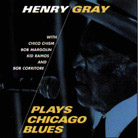June 2001
Who? Isn’t that always the way? We know and can identify the imitators all too well, but the genuine articles, the true originals, can walk right past us, slap us on our collective backsides, and still pass by unnoticed. Such seems to be the case for Henry Gray, who, after over 50 years in the music business, is still relatively unknown, still pumping out the classic Chicago blues he helped establish. Henry Gray, along with Pinetop Perkins, is one of the last remaining real Chicago blues pianists alive. He was born just outside of New Orleans in a little town called Kenner, and moved to Chicago in 1946, after serving a stint with his Uncle Sam during WWII. After spending a few years clubbing around, Gray came first to the attention, and then under the influence, of the legendary barrelhouse pianist Big Maceo Merriwether. In 1956, having honed his craft at the feet of one of the undisputed masters, and gigging around with other young blues musicians, he got THE call -- he was asked to join the band of the great Howlin' Wolf. For the next dozen years, while a mainstay in Wolf’s band, Gray still found time to perform with blues giants like Muddy Waters, Jimmy Rogers and Little Walter, among others, for the Chess label. And since leaving Wolf, the list of Blues musicians that Gray has played with would choke a horse: B.B. King, Elmore James, Robert Lockwood Jr., Billy Boy Arnold, Johnny Shines, Hubert Sumlin, Lazy Lester, Jimmy Reed, Little Milton, Buddy Guy, James Cotton, Guitar Slim, Koko Taylor, and Taj Mahal (you Analogue Productions fans, recognize any of those names?). You don’t get to play with musicians of that caliber if you don’t have talent. Henry Gray can play. He can also sing, with a leather-and-whiskey voice that fits his blues piano style perfectly. Gray breaks no new musical ground here, but then, why should he? When you’re an original, you just do what you do and do it well. That, in a nutshell, is Henry Gray's Plays Chicago Blues. Gray, together with former Wolf alumnus Chico Chism on drums, Bob Margolin or Kid Ramos on guitar and Bob Corritore (who also produced this album) on harmonica, has produced a record that is a prime example of what electric Chicago blues is all about. The sound here, in contrast to the music, is something of a disappointment. It’s easy to tell that this is a multi-track studio recording. There is little air evident. The soundstage, what there is of it, is between the speakers and flat, with everything piled up on everything else. Nothing stands out except the Gray’s piano, voice and, of course, the music. But the sound is never bad enough to get in the way of Henry Gray and his blues. After 76 years of life and over a half-century of playing the blues, Henry Gray has honed his craft down to the bare essentials. He doesn’t try to sugarcoat his style or cater to the masses. And he doesn’t do covers or "pop"ularize his music. All he does is sing and play the blues. Just like a true original. If you’re not sure whether or not you like this type of blues, or you’d just like one album that sums up this style to add to your collection, then Plays Chicago Blues just might be your ticket. If you’re a blues fan, get that ticket punched ASAP. GO BACK TO: |
 Henry Gray - Plays
Chicago Blues
Henry Gray - Plays
Chicago Blues![[Reviewed on CD]](../format/regcd.gif) How do
you go about identifying the genuine article when you hear it? What qualities do you
listen for that tell you the difference between an original and a clone? I might not have
all the answers, but I do know someone who does: Henry Gray.
How do
you go about identifying the genuine article when you hear it? What qualities do you
listen for that tell you the difference between an original and a clone? I might not have
all the answers, but I do know someone who does: Henry Gray.